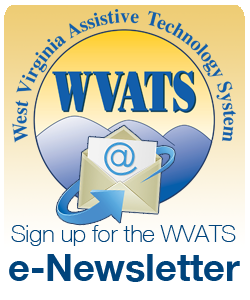Spring 2018

Download a PDF of this Newsletter
Articles:
- Camp Gizmo: What a Bright Idea
- A Guide to Special Education Advocacy
- Powerful Tools
- New Year Fresh Start
- Hocky is for Everyone
Camp Gizmo: What a Bright Idea
Camp Gizmo is an assistive technology camp for families of children with disabilities from birth to eight years old. The camp has been an annual event since July 1996. It has a long history of helping children with disabilities and their families overcome obstacles relating to education and independence.
During camp, teams of professionals help each family identify tools and strategies to meet their assistive technology needs. The child, with their family, attends a variety of labs and sessions to focus on their specific needs. Camp Gizmo labs include mobility, speech communication, sensory, feeding and swallowing, activities of daily living and switch access.
This five-day event is for the entire family. In addition to labs and workshops, camp also offers Kids Camp for all children attending camp. This includes the child with a disability, siblings and the children of professionals attending camp. Kids Camp is overseen by Camp Gizmo veterans and provides a variety of educational and recreational activities.
Camp Gizmo also provides continuing education and graduate hours for early childhood professionals and has partnerships with West Virginia University, Wheeling Jesuit and Marshall University. The camp provides an opportunity to teach and provide indepth training for college students, parents and early childhood professionals on how assistive technology can aid children with disabilities by working with professional teams. The teams consist of professionals from around the state, graduate students and returning families. While the camp is helping individual families that are selected for camp, it is also increasing core knowledge, competencies and awareness of assistive technology for young children.
Camp Gizmo staff have the knowledge to help families navigate early childhood and education systems.
Camp Gizmo is scheduled for July 7 – 11 and is held on the campus of the West Virginia Schools for the Deaf and the Blind in Romney, WV. To learn more about Camp Gizmo and the application process visit wvearlychildhood.org/CampGizmo.
Camp Gizmo is funded by the West Virginia Department of Education Office of Special Programs, West Virginia Department of Health and Human Resources (WVDHHR), Bureau for Public Health, Office of Maternal, Child and Family Health, WV Birth to Three, and WVDHHR Division of Early Care and Education. In-kind support is provided by the West Virginia Assistive Technology System, WVU Center for Excellence in Disabilities, National Seating and Mobility and Assistive Technology Works, Inc.
After attending camp, one parent made the following comment:
"Finding out there is a possibility my wee one can ride a bicycle was an answered prayer and a dream come true. Finding out there are strollers that will help me get him here and there when he is too overwhelmed or tired to walk was weight off my shoulders. Finding out our feeding plan is good and moving us in the right direction is reassuring enough that I know the best is yet to come and together we can climb any hill and crush any mountain."
A Guide to Special Education Advocacy
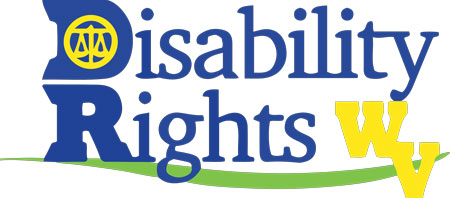
The Individualized Education Planning (IEP) process is a time to work together on supports and services for students with disabilities. If a student needs assistive technology (AT) to access or participate in their education, school districts are responsible for providing it. The IEP team decides what these needs are through evaluations and assessments.
When choosing AT devices and services, there are many things to think about. Some of these include the student’s disability, environment, technology options and preferences. Students should play an active role as a member of the IEP team. They should be included in the AT evaluation, eligibility and determination processes. This will help students succeed from school into the workplace.
Many parents have requested help to understand special education policies and procedures in West Virginia. To help these parents, the West Virginia Developmental Disabilities Council (WVDDC) and Disability Rights of West Virginia (DRWV) developed A Parent’s Advocacy Guide to Special Education.
This Guide is for family members, students, educators and advocates for students with disabilities. It is a companion guide to the West Virginia Department of Education Policy 2419.
The Guide is available free of charge and can be found on DRWV’s website. To request a copy, call DRWV. This guide contains information on the AT evaluation process and includes a sample letter that parents may use to ask the school to complete an AT evaluation.
For more information, visit drofwv.org, call 800-950-5250 or email contact@drofwv.org.
Powerful Tools
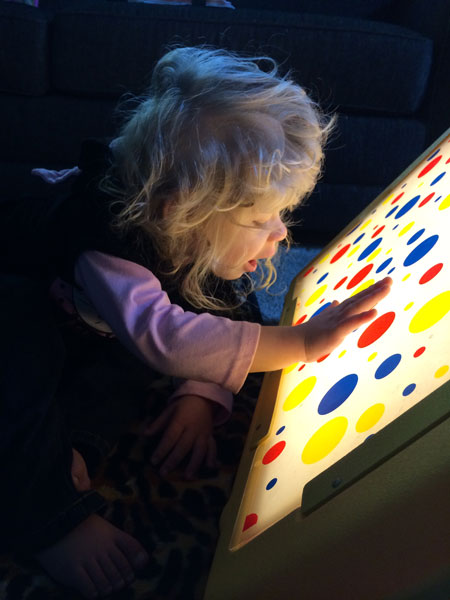
WVATS offers many assistive technology solutions that assist kids with different types of barriers. Below are a few items available for loan. WVATS has many additional items, and staff can assist you with your needs. Call WVATS to find out more about assistive technology designed for kids.
Light Table
This floor version light table can be a teaching tool for people with vision impairments. The light table can be used for object and shape identification, writing, arts and crafts as well as other skills. The raised edges help keep objects in a confined area. The table can be used on the floor with the legs, or on a table without the legs.
Totally Tactile Communicator
The Totally Tactile Communicator is designed for visually impaired users. This communicator features brightly colored plates with raised designs. It has a changeable activation time that gives users time to recognize and activate their message. Features six levels and 36 messages that come mounted on a spinning base.
Time Tracker Mini
![]()
This timer offers visual and auditory displays and includes a warning alarm. It works easily with two dials to control the total alarm time and warning time. The total alarm time ranges from five minutes to two hours. The timer counts down until the colored light glows and the alarm sounds. The volume can be adjusted or turned off if visual timing is preferred.
BOOM'R Beeper Ball
The Beeper Ball makes loud electronic sounds to assist those with limited vision in participating in activities. Inside the ball is a battery-powered beeper in a protective case. The rugged ball can be thrown, bounced or kicked.
Switch Adapted Spin N Swirl Painter Kit
The Spin n Swirl Splatter Painter Kit is an art tool that uses a turntable to splash paint onto the paper canvas. It has been adapted for use with a battery interrupter. Switch activation is used to turn the turntable on and off.
Multi-Color Talking Cube Clock
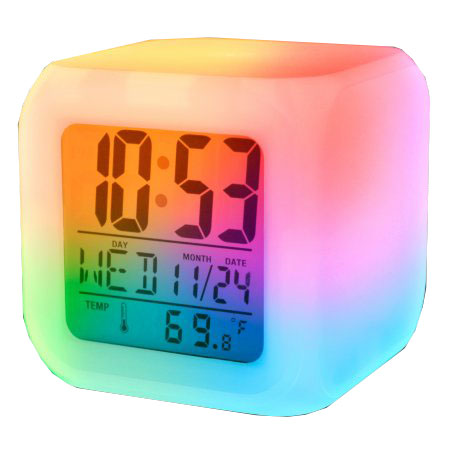
The TK-01 is a cube shaped digital clock with LCD display. It has an extra-large speak button, a choice of three different alarm sounds and an hourly report.
LAMP Words for Life App for the iPad
The LAMP Words for Life app is a full featured communication app. It combines the PRC Unity® language system with Language Acquisition through Motor Planning (LAMP) principles and strategies. The app uses symbols paired with text to support literacy development.
For more information on LAMP principles and strategies, visit the Center for AAC and Autism at aacandautism.com. Apps requested through the WVATS Loan Library are loaded onto a WVATS-owned iPad/iPod Touch.
Retractable Pincer Switch
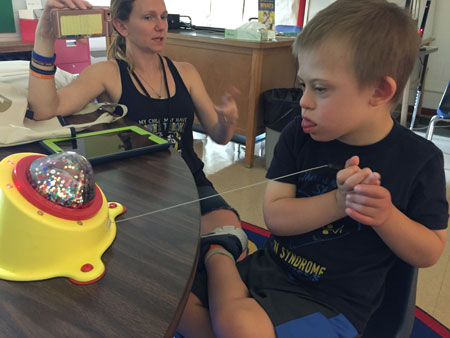
The Retractable Pincer Switch comes with five different pincer grips: a plastic textured ring, a T-handle, a small metal ring, a yellow round grip and a flat grip. It can be used to help practice fine motor gripping skills. When you pull the cord with a pincer grip, a glitter dome lights up, plays music and vibrates. The light, music and vibration can be turned on and off. This allows the user to choose the combination that is the most rewarding.
Farm and Garden
New Year Fresh Start
Spring is the season of new life and new growth. Once the ground is thawed out from the cold of winter, farmers often plant their crop. In order to do so, they must break up the thick and solid ground with the help from assistive technology. While technology can make life easier on everyone, assistive technology can make farming possible for individuals with a disability. Assistive technology includes any kind of device, modification or service that will help a person with a disability work and live more independently.
Farmers using assistive technology can get a jump-start on spring preparation with this list.
Conduct an inspection
Take a tour of your premises and inspect your fencing, buildings and machinery for signs of wear and tear. Having a free farm assessment done can evaluate the need for assistive technology or modifications to worksites to improve farm accessibility and prevent injuries.
Complete general maintenance
List the needed repairs of farm equipment. Be aware that this can be one of the busiest times of year for farm mechanics so schedule now. Make sure you have all the equipment and tools necessary if you choose to undertake simpler tasks such as replacing damaged fencing yourself.
Cut your hedges
Cut your hedges now but also prune any climbers or perennials to stimulate new spring growth. Consider an Easy Lift harness to make trimming less stressful on your back.
Clean livestock shelters
With milder temperatures returning, you will soon be able to put your livestock back out to pasture and when you do, give livestock shelters a thorough cleaning. Choose an ergonomic shovel to prevent joint damage.
Check animal health
As the birthing season approaches, make sure your animal’s shots are up to date and get their general health checked over by a vet. The use of headgates will allow you to view animals closely without having to hold on to a lead.
pH test your soil
Depending on your crop type and the seasonal weather in your region, you may be harvesting and delivering your produce to buyers or cultivating the soil in preparation for sowing. This may be a good time to test the pH and nutrient levels of your soil.
Ventilate greenhouses
The weather may be far from tropical but even on cool, sunny days, greenhouse temperatures can rise quickly. Protect your plants by ventilating your greenhouses. A greenhouse monitoring system can alert your phone when temperatures get too high.
Tackle the paperwork
No one likes paperwork but in order for your farm to manage its supplies and costs and turn a profit, it has to be tackled. Whether it is the annual tax return or the filing of invoices, settle down and get it done.
Try something new
With sowing season just a few weeks away, this is a great time to look over your grain or vegetable crops and consider growing something new. Allocate some space, purchase some seeds and give those green thumbs a workout. Be sure to check your region to see what crops grow best in your area.
Take care of yourself
Farming is a marathon, not a sprint and if you want to survive the year ahead then set aside a little time to take care of yourself. Whether that means leaving the farm altogether for a break or just replacing your farm clothing, frequent breaks are key to preventing secondary injuries from preexisting conditions.
WVATS offers many assistive technology solutions that can help you on the farm. Items are offered through the WVATS loan library, and staff are available to assist you. Call WVATS to find out more about the loan library program.
Hockey is for Everyone
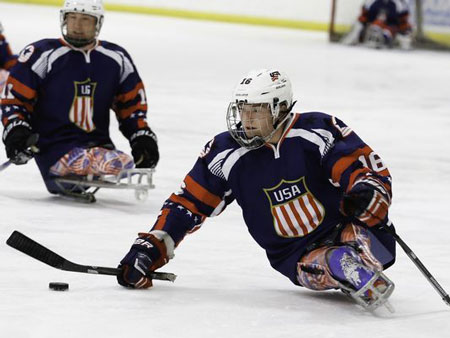
Sled hockey is an exciting sport for players with physical challenges. Sled hockey is played sitting on a sled, with two shorter hockey sticks instead of one. The sled has blades on the bottom to slide on the ice and the sticks each have one curved end, similar to regular hockey sticks, and one serrated end that allows players to propel themselves across the ice. The Charleston Thunder is the first sled hockey team in West Virginia, although there are many teams in Ohio and Pennsylvania. The Thunder accepts players of all ages. Their regular season runs from October to early March.
For more information about sled hockey, visit usahockey.com/sledhockey. For information about the Charleston Thunder, contact Linda Streets at l.streets52@gmail.com.

